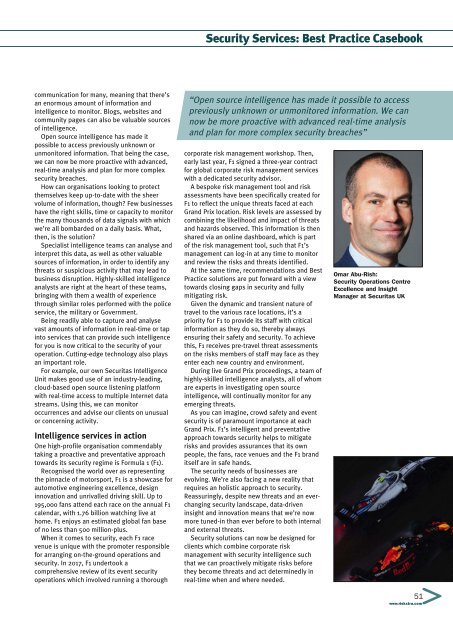RiskXtraJune2019
You also want an ePaper? Increase the reach of your titles
YUMPU automatically turns print PDFs into web optimized ePapers that Google loves.
Security Services: Best Practice Casebook<br />
communication for many, meaning that there’s<br />
an enormous amount of information and<br />
intelligence to monitor. Blogs, websites and<br />
community pages can also be valuable sources<br />
of intelligence.<br />
Open source intelligence has made it<br />
possible to access previously unknown or<br />
unmonitored information. That being the case,<br />
we can now be more proactive with advanced,<br />
real-time analysis and plan for more complex<br />
security breaches.<br />
How can organisations looking to protect<br />
themselves keep up-to-date with the sheer<br />
volume of information, though? Few businesses<br />
have the right skills, time or capacity to monitor<br />
the many thousands of data signals with which<br />
we’re all bombarded on a daily basis. What,<br />
then, is the solution?<br />
Specialist intelligence teams can analyse and<br />
interpret this data, as well as other valuable<br />
sources of information, in order to identify any<br />
threats or suspicious activity that may lead to<br />
business disruption. Highly-skilled intelligence<br />
analysts are right at the heart of these teams,<br />
bringing with them a wealth of experience<br />
through similar roles performed with the police<br />
service, the military or Government.<br />
Being readily able to capture and analyse<br />
vast amounts of information in real-time or tap<br />
into services that can provide such intelligence<br />
for you is now critical to the security of your<br />
operation. Cutting-edge technology also plays<br />
an important role.<br />
For example, our own Securitas Intelligence<br />
Unit makes good use of an industry-leading,<br />
cloud-based open source listening platform<br />
with real-time access to multiple Internet data<br />
streams. Using this, we can monitor<br />
occurrences and advise our clients on unusual<br />
or concerning activity.<br />
Intelligence services in action<br />
One high-profile organisation commendably<br />
taking a proactive and preventative approach<br />
towards its security regime is Formula 1 (F1).<br />
Recognised the world over as representing<br />
the pinnacle of motorsport, F1 is a showcase for<br />
automotive engineering excellence, design<br />
innovation and unrivalled driving skill. Up to<br />
195,000 fans attend each race on the annual F1<br />
calendar, with 1.76 billion watching live at<br />
home. F1 enjoys an estimated global fan base<br />
of no less than 500 million-plus.<br />
When it comes to security, each F1 race<br />
venue is unique with the promoter responsible<br />
for arranging on-the-ground operations and<br />
security. In 2017, F1 undertook a<br />
comprehensive review of its event security<br />
operations which involved running a thorough<br />
“Open source intelligence has made it possible to access<br />
previously unknown or unmonitored information. We can<br />
now be more proactive with advanced real-time analysis<br />
and plan for more complex security breaches”<br />
corporate risk management workshop. Then,<br />
early last year, F1 signed a three-year contract<br />
for global corporate risk management services<br />
with a dedicated security advisor.<br />
A bespoke risk management tool and risk<br />
assessments have been specifically created for<br />
F1 to reflect the unique threats faced at each<br />
Grand Prix location. Risk levels are assessed by<br />
combining the likelihood and impact of threats<br />
and hazards observed. This information is then<br />
shared via an online dashboard, which is part<br />
of the risk management tool, such that F1’s<br />
management can log-in at any time to monitor<br />
and review the risks and threats identified.<br />
At the same time, recommendations and Best<br />
Practice solutions are put forward with a view<br />
towards closing gaps in security and fully<br />
mitigating risk.<br />
Given the dynamic and transient nature of<br />
travel to the various race locations, it’s a<br />
priority for F1 to provide its staff with critical<br />
information as they do so, thereby always<br />
ensuring their safety and security. To achieve<br />
this, F1 receives pre-travel threat assessments<br />
on the risks members of staff may face as they<br />
enter each new country and environment.<br />
During live Grand Prix proceedings, a team of<br />
highly-skilled intelligence analysts, all of whom<br />
are experts in investigating open source<br />
intelligence, will continually monitor for any<br />
emerging threats.<br />
As you can imagine, crowd safety and event<br />
security is of paramount importance at each<br />
Grand Prix. F1’s intelligent and preventative<br />
approach towards security helps to mitigate<br />
risks and provides assurances that its own<br />
people, the fans, race venues and the F1 brand<br />
itself are in safe hands.<br />
The security needs of businesses are<br />
evolving. We’re also facing a new reality that<br />
requires an holistic approach to security.<br />
Reassuringly, despite new threats and an everchanging<br />
security landscape, data-driven<br />
insight and innovation means that we’re now<br />
more tuned-in than ever before to both internal<br />
and external threats.<br />
Security solutions can now be designed for<br />
clients which combine corporate risk<br />
management with security intelligence such<br />
that we can proactively mitigate risks before<br />
they become threats and act determinedly in<br />
real-time when and where needed.<br />
Omar Abu-Rish:<br />
Security Operations Centre<br />
Excellence and Insight<br />
Manager at Securitas UK<br />
51<br />
www.riskxtra.com>
















